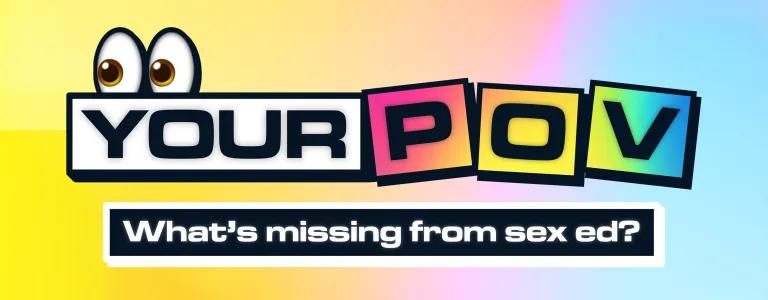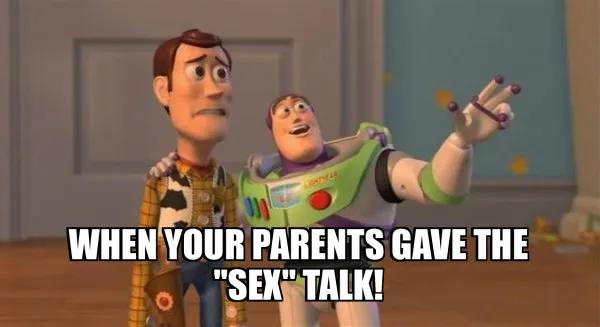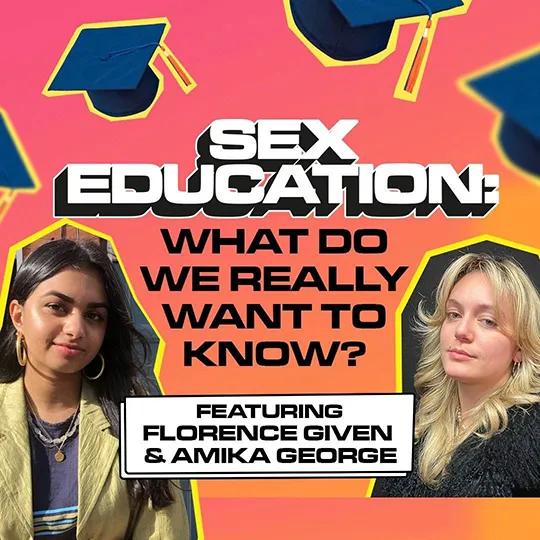
Your POV: What’s missing from sex ed?
Written by NCS…POV by you…
7 min read
Recently, we asked for your opinions on what you think is missing from sex education, wherever you’ve been taught it; in school, from friends and fam, or online.
These answers are intended for those above the age of consent (that’s 16 in the UK!).
Sex education issues
If you’ve had sex already, maybe you felt something was missing. If you’re thinking about doing it, maybe you’re curious to know more. And if you’re nowhere near ready maybe you just want to know all the info you can before taking the leap.
We got a number of great responses from you, and it was clear you think there are gaps in sex education! So we’ve collated your responses and put them into different themes. Here’s what you had to say, and some great resources for you to learn a whole lot more.

Pleasure and intimacy
This was a big one. A lot of you agree that when it comes to what you’re taught about sex, it’s all biology.
You’re essentially being given step by step instructions on what the act actually is, but not being taught much (if anything) about how it will make you feel, and the pleasure side of it. One response, from Lana (17), really hit the nail on the head:
“Nobody decides to have sex so that they can find out more about biology, they do it for pleasure, yet funnily enough that's the biggest topic that most schools and institutions brush under the rug. It's always all about the biology behind sex, never the actual intimate act. Of course you need to be educated and aware of the health risks and how to stay safe, but you also need to be informed of the warped expectations and the distinctive reality of how sexual relations really go down.”
How to talk about pleasure
Our podcast, Youth Rising, had an interview with Sunday Times best selling author, Florence Given, on this exact topic.
She talked all about pleasure and focused especially on talking about it with your peers and how there seems to be shame and the feeling of ‘taboo subjects’ surrounding these conversations. Among lots of other gems, she says, of pleasure:
“It was like this thing that all of the women I knew had also done that, but they were going to take it to their deathbed that they did it. They did not want to tell anyone…you can learn to not feel shameful about pleasuring yourself and about wanting pleasure for your body”
Take a listen to the whole episode and see what you think!

How to find pleasure
Others of you said there were gaps related to pleasure and the use of toys, either with partners or for yourself. How to use them, what they’re for and the best ones for different feelings.
Our friends at Fumble (the free digital sex ed resource for the 21st century) have a great page all about this, with details on dildos, info on intimacy, and tips on toys.
They also have a whole blog dedicated to pleasure which goes over:
- What it means to you
- How to find it in your romantic or sexual relationships
- And whether discussing it is something you find easy or tough
LGBTQ+ sex education
Another big topic that you feel is missing from sex ed, is sex within the LGBTQ+ community. It seems that the majority of you only get taught about straight sex, and have to research yourself for any information about how sex works in different types of relationships and couplings.
“Same-sex information. Like wow…it's all man and woman education.” – Darcy, 17
Repeal of Section 28
In education, a lot of this is down to the legacy of Section 28 of the Local Government Act, a piece of legislation which came into effect in 1988. This legislation forbade local authorities to ‘promote homosexuality’ or permit maintained schools to teach ‘the acceptability of homosexuality’.
What this meant was that schools couldn’t teach about LGBTQ+ people and couldn’t provide advice, information, or support for pupils who were LGBTQ+ or thought they might be – it would have been against the law to do this.
Though Section 28 was repealed in England and Wales in 2003 (and 2000 in Scotland), lots of school staff haven’t been trained in how to talk about LGBTQ+ people in school, or how to support LGBTQ+ young people, and therefore don’t feel confident doing this, even when they really want to. We have come a long way, but there is much further to go.
Why LGBTQ+ sex should be talked about
One response, from Laila (16), said, “I think gay sex needs to be taught as well as it is just as important.”
And that’s totally true! Whether you’re having, thinking about, or curious of sex with a partner of the same gender as you, it’s just as important as any other sex you get taught about.
LGBTQ+ sex on screen
These days, there are lots of great TV shows that delve into same sex relationships and the intricacies, joy, and intimacy that come along with them:
- Heartstopper
- Pose
- It’s a Sin
- Sex Education
- and Dear White People to name a few.
The YouTube channel, Bits and Bods, also has a great video celebrating all things queer; sex, relationships, identity and more. They also have a number of different videos about sex, bodies, relationships and all the bits in between.
Consent education
Being taught about contraception and consent is a topic that again, you feel is there, but lacking in real information.
One response, from Rhiannon (21), said,
“I got a lot of my basic sexual education, although calling it that is even a stretch. Abstinence was promoted as a main method of contraception - which is unrealistic. We should get taught about different methods of contraception and how consent within a sexual interaction can present itself”
Lots of you agree that the video below about consent “can only do so much for preparing young adults and teens for the realities and boundaries”.
According to you guys, the TV show Normal People also does a good job of showing consent in a, well, normal way! Main characters, Marianne and Connell, are about to have sex, and for Marianne, this is her first time ever.
Connell reminds her, that “If you want me to stop or anything, we can obviously stop,” he says. “If it hurts or anything, we can stop. It won’t be awkward.”
This might seem like a little thing, but it’s also something that isn’t really shown much in the media. The fact that consent means that at ANY time if you change your mind, you’re changing your consent, and that should be respected. And that sex should be all about communication.
Contraception education and resources
Brook, the UK’s leading sexual health and wellbeing charity for under 25s, has really great resources on different methods of contraception, from condoms to coils, pills to patches, and everything in between.
They even have a contraception tool, to see which method would be best for you. And, they have a number of real life stories you can read too.
If you’re aged 13-24, you can also get access to the C-Card, which is a scheme for young people to access free condoms and lube to improve sexual health. You can join the scheme by popping in your postcode and finding your local C-Card pickup point, then use your C-Card to collect more condoms and lube packs.
STI education and support
And finally, the last theme that was talked about quite regularly in your responses, was STIs and STI support.
Dylan (17) responded, saying that “STI and pregnancy awareness” is needed, and Rhiannan agreed, saying that “more information on STIs and the methods of transmission for each” was something that was lacking.
We actually just published a blog with Brook all about STIs; the stats, how to get help, knowing that there’s no shame when it comes to status, and common myths and their counter facts.
They also have more resources on types of STIs, a symptom checker, and more real life stories to read through too.
Your POV: done
So that’s it, the whole hog! Some really great opinions and interesting to see how the same subjects came up between all of you. It shows that no matter where you’re from, your background, your beliefs, there will always be connections to be made. Whether you’re talking about what’s missing from sex education or wondering if going on an NCS experience alone would be worth it 👀 (quick answer, yes, totally, 100%!)
Find out more about our experiences and how you can make connections with people and have some thought provoking discussions (and a bunch of fun) today.

